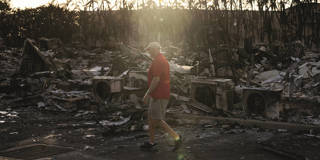Climate change is not only destroying lives and livelihoods, but also introducing new systemic risks to the financial system and the broader economy. The warning signs of another 2008-scale financial crisis are flashing red across multiple economic sectors, and behind them looms the collapse of Earth’s natural systems.
WASHINGTON, DC – This June was the hottest on record, and it was followed by the hottest-ever week in early July, which then turned out to be the hottest month on record. Canada’s unprecedented wildfires blanketed huge swaths of North America in smoke; storms in Vermont, New York, and Pennsylvania triggered deadly floods; the Midwest has been experiencing its worst drought in over a decade; Europe is baking; China hit record-high temperatures; and Italy suffered its worst flooding in 100 years.

WASHINGTON, DC – This June was the hottest on record, and it was followed by the hottest-ever week in early July, which then turned out to be the hottest month on record. Canada’s unprecedented wildfires blanketed huge swaths of North America in smoke; storms in Vermont, New York, and Pennsylvania triggered deadly floods; the Midwest has been experiencing its worst drought in over a decade; Europe is baking; China hit record-high temperatures; and Italy suffered its worst flooding in 100 years.